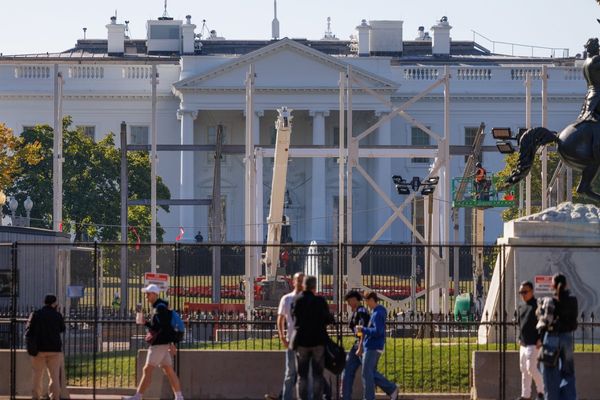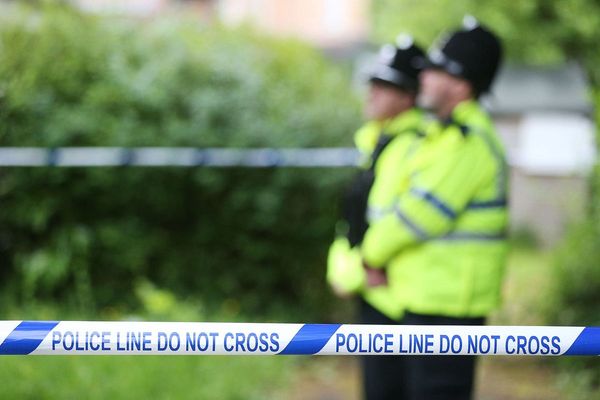
Victoria has outlawed the swastika. The Nazi salute is next. Will brown shirts follow?
The criminal law is the bluntest instrument a state or territory government has for enforcing acceptable social norms. Because its consequences are dire for anyone caught on the wrong side of whichever line it draws, we should always step with extreme care. Too often, governments don’t.
The announcement by Victoria’s Attorney-General Jaclyn Symes that her government will legislate to ban the Nazi salute followed quickly on the heels of the small group of black-clad fuckwits who paraded outside Victoria’s Parliament House at the weekend, adding their support to the current hatred-du-jour, transphobia.
True, they looked like a particularly poorly rehearsed dance troupe as they marched for the cameras, arms outstretched at various angles in their pathetic attempt at a Heil Hitler. But Nazis are never laughable, and these men are — make no mistake — proto-Nazis. Their spectacle, though small, was almost as intolerable as some police officers’ evident enthusiasm for protecting them from the far larger crowd of trans activists.
Last December Victoria moved to make public displays of the Nazi swastika — technically, as the legislation sets out in painful detail, the Hakenkreuz or “crooked cross”, to distinguish it from the ancient swastika symbol used in the Buddhist, Hindu and Jain religions and much later co-opted by the Nazis — a criminal offence. This followed NSW’s move to do the same in August 2022.
Tasmania, Western Australia and the ACT are following suit, and Queensland has said its law is going to even include swastika tattoos. It’s fair to say that the conversation about swastika displays is over, although its speed — and the lack of any debate — was a bit surprising given Australia had resisted any such move for so many decades on the basis of free speech.
Victoria’s announcement likewise suggests there’s no need for a conversation before it becomes a crime to give a stiff-arm salute in public. But really there is, even if we think we already know how it will end.
The governing principle of the common law was always that human freedom is a default; any legal impingement on it must be properly justified by a higher and greater need. That remains the best way to think about it, because it forces us (and our governments) to avoid knee-jerk reactions.
It is easy to justify criminalising actions that cause direct physical or material harm, such as assault, theft or fraud. The balance of rights is obvious: one person’s personal safety and property rights trump another’s freedom to violate them.
We have always accepted that words and gestures can cause harm too, in some cases such that it is appropriate to make them unlawful. Some of these used to be uncontroversially criminal but are no longer banned because we’ve moved on — blasphemy and lèse-majesté are classic examples.
At the same time, as society’s attitudes have evolved, many things that were once openly tolerated, such as racial vilification and other hate speech targeting minorities, have become targets of the law. We recognise that words can hurt their targets in a direct way, so much that it is fair to apply legal consequences to their deployment.
More importantly, we also recognise that malign actions and words sit at the beginning of a continuum that can lead to seriously evil ends. The Nazis started with rhetoric and street marches, and ended with genocide. We allow their political descendants, no matter how pig ignorant and pathetically stupid they may be, to prosper at our collective peril.
And of course there’s history. Words and symbols carry meaning, weight, consequence. Every time a swastika is displayed or a Heil Hitler is made, we are confronted with the memory of the worst human-inflicted catastrophe of all history, the one we must never allow to be repeated in even the slightest degree.
So there is a solid case for bringing the blunt force of the criminal law to bear on the performative trimmings of Nazism, because nobody does these things accidentally and without some understanding of the evil they are play-acting; the harm is not theoretical but real.
Are tiki torches next? And brown shirts, or the outfit of American neo-Nazis’ choice, the polo shirt and khaki pants? The answer to the last one is awkward, since it’d take out the wardrobes of so many Young Liberals, but the question of clothing clearly illustrates the problem of where to draw the line. It might be justifiable to outlaw SS uniforms, or at least the death’s head insignia, but if our local Nazis keep recruiting and start marching in distinctive uniform attire of any kind — clown suits, even — then the law may need to respond.
My point is that there is nothing inherent in any word, gesture or symbol that can justify its prohibition. It is only the baggage that history has attached to it that renders it dangerous. The law, consequently, must be applied with extreme care, mindful of unintended consequences and ready to be moderated or withdrawn if and when the danger has passed.
We should always — media, politicians and punters — be prepared to have these conversations in the open, before we rush to ban.
Is banning the Nazi salute an overreach? Let us know by writing to letters@crikey.com.au. Please include your full name to be considered for publication. We reserve the right to edit for length and clarity.







